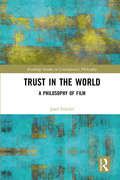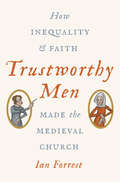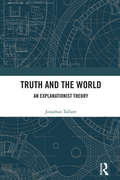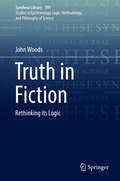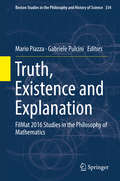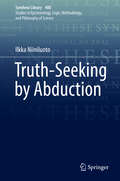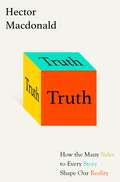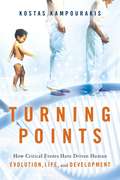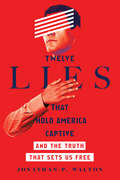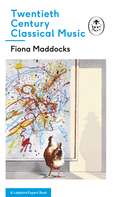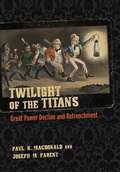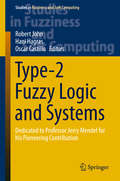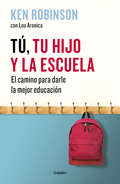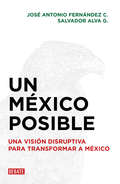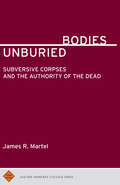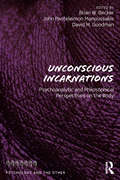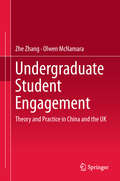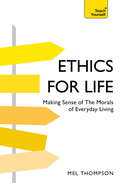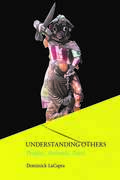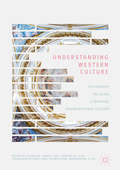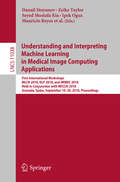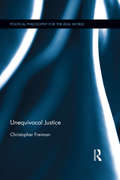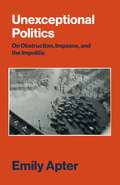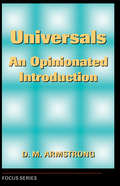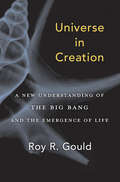- Table View
- List View
Trust in the World: A Philosophy of Film (Routledge Studies in Contemporary Philosophy)
by Josef FrüchtlThis book examines the theory, originally raised in Gilles Deleuze’s philosophy of film, that cinema has the power to restore our trust in the world. Früchtl demonstrates that cinema does this in three main ways: by restoring our belief in the absurd, in the body and in a sceptical abstention from judging and acting. Cinema shares this ability with other arts, but what sets it apart in particular is that it evokes Modernity and its principle of subjectivity. This book further develops the idea of trust and cinema by synthesizing the philosophies of complementary thinkers such as Kant, Nancy, Agamben, Benjamin and Rancière. It concludes with examination of Cavell’s solution to the problem of scepticism and a synthesis of Kantian aesthetic theory with Cavellian pragmatism. Originally published in German under the title Vertrauen in die Welt, this English-language translation features a new introduction that situates Früchtl’s work within contemporary analytical philosophy of film. It will be of interest to scholars working in Continental aesthetics, philosophy of film, and film theory.
Trustworthy Men: How Inequality and Faith Made the Medieval Church
by Ian ForrestThe medieval church was founded on and governed by concepts of faith and trust--but not in the way that is popularly assumed. Offering a radical new interpretation of the institutional church and its social consequences in England, Ian Forrest argues that between 1200 and 1500 the ability of bishops to govern depended on the cooperation of local people known as trustworthy men and shows how the combination of inequality and faith helped make the medieval church.Trustworthy men (in Latin, virifidedigni) were jurors, informants, and witnesses who represented their parishes when bishops needed local knowledge or reliable collaborators. Their importance in church courts, at inquests, and during visitations grew enormously between the thirteenth and fifteenth centuries. The church had to trust these men, and this trust rested on the complex and deep-rooted cultures of faith that underpinned promises and obligations, personal reputation and identity, and belief in God. But trust also had a dark side. For the church to discriminate between the trustworthy and untrustworthy was not to identify the most honest Christians but to find people whose status ensured their word would not be contradicted. This meant men rather than women, and—usually—the wealthier tenants and property holders in each parish. Trustworthy Men illustrates the ways in which the English church relied on and deepened inequalities within late medieval society, and how trust and faith were manipulated for political ends.
Truth and the World: An Explanationist Theory
by Jonathan TallantHow do we explain the truth of true propositions? Truthmaker theory is the branch of metaphysics that explores the relationships between what is true and what exists. It plays an important role in contemporary debates about the nature of metaphysics and metaphysical enquiry. In this book Jonathan Tallant argues, controversially, that we should reject truthmaker theory. In its place he argues for an 'explanationist' approach. Drawing on a deflationary theory of truth he shows that it allows us to explain the truth of true propositions and respond to recent arguments that purport to show otherwise. He augments this with a distinction between internally and externally quantified claims: externally quantified claims are claims that quantify over elements of our ontology that play an indispensable explanatory role; internally quantified claims do not. He deploys this union of deflationism and a distinction between kinds of quantification to pursue metaphysical inquiry, sketching the implications for a number of first-order debates, including those in the philosophy of time, modality and mathematics, and also shows how this explanationist model can be used to solve the key problems that afflicted truthmaker theory. Truth and the World is an important contribution to debates about truth and truthmaker theory as well as metametaphysics, the metaphysics of time and the metaphysics of mathematics, and is essential reading for students and scholars engaged in the study of these topics.
Truth in Fiction: Rethinking Its Logic (Synthese Library #391)
by John WoodsThis monograph examines truth in fiction by applying the techniques of a naturalized logic of human cognitive practices. The author structures his project around two focal questions. What would it take to write a book about truth in literary discourse with reasonable promise of getting it right? What would it take to write a book about truth in fiction as true to the facts of lived literary experience as objectivity allows?It is argued that the most semantically distinctive feature of the sentences of fiction is that they areunambiguously true and false together. It is true that Sherlock Holmes lived at 221B Baker Street and also concurrently false that he did. A second distinctive feature of fiction is that the reader at large knows of this inconsistency and isn’t in the least cognitively molested by it. Why, it is asked, would this be so? What would explain it?Two answers are developed. According to the no-contradiction thesis, the semantically tangled sentences of fiction are indeed logically inconsistent but not logically contradictory. According to the no-bother thesis, if the inconsistencies of fiction were contradictory, a properly contrived logic for the rational management of inconsistency would explain why readers at large are not thrown off cognitive stride by their embrace of those contradictions. As developed here, the account of fiction suggests the presence of an underlying three - or four-valued dialethic logic. The author shows this to be a mistaken impression. There are only two truth-values in his logic of fiction.The naturalized logic of Truth in Fiction jettisons some of the standard assumptions and analytical tools of contemporary philosophy, chiefly because the neurotypical linguistic and cognitive behaviour of humanity at large is at variance with them. Using the resources of a causal response epistemology in tandem with the naturalized logic, the theory produced here is data-driven, empirically sensitive, and open to a circumspect collaboration with the empirical sciences of language and cognition.
Truth, Existence and Explanation: FilMat 2016 Studies in the Philosophy of Mathematics (Boston Studies in the Philosophy and History of Science #334)
by Mario Piazza Gabriele PulciniThis book contains more than 15 essays that explore issues in truth, existence, and explanation. It features cutting-edge research in the philosophy of mathematics and logic.Renowned philosophers, mathematicians, and younger scholars provide an insightful contribution to the lively debate in this interdisciplinary field of inquiry. The essays look at realism vs. anti-realism as well as inflationary vs. deflationary theories of truth. The contributors also consider mathematical fictionalism, structuralism, the nature and role of axioms, constructive existence, and generality. In addition, coverage also looks at the explanatory role of mathematics and the philosophical relevance of mathematical explanation.The book will appeal to a broad mathematical and philosophical audience. It contains work from FilMat, the Italian Network for the Philosophy of Mathematics. These papers collected here were also presented at their second international conference, held at the University of Chieti-Pescara, May 2016.
Truth-Seeking by Abduction (Synthese Library #400)
by Ilkka NiiniluotoThis book examines the philosophical conception of abductive reasoning as developed by Charles S. Peirce, the founder of American pragmatism. It explores the historical and systematic connections of Peirce's original ideas and debates about their interpretations. Abduction is understood in a broad sense which covers the discovery and pursuit of hypotheses and inference to the best explanation. The analysis presents fresh insights into this notion of reasoning, which derives from effects to causes or from surprising observations to explanatory theories.The author outlines some logical and AI approaches to abduction as well as studies various kinds of inverse problems in astronomy, physics, medicine, biology, and human sciences to provide examples of retroductions and abductions. The discussion covers also everyday examples with the implication of this notion in detective stories, one of Peirce’s own favorite themes.The author uses Bayesian probabilities to argue that explanatory abduction is a method of confirmation. He uses his own account of truth approximation to reformulate abduction as inference which leads to the truthlikeness of its conclusion. This allows a powerful abductive defense of scientific realism. This up-to-date survey and defense of the Peircean view of abduction may very well help researchers, students, and philosophers better understand the logic of truth-seeking.
Truth: How the Many Sides to Every Story Shape Our Reality
by Hector MacDonaldFrom one of the world's leading experts in business storytelling, and for readers of Daniel Levitin, Nate Silver, and Charles Duhigg, Truth: A User's Guide is about the different types of competing truths we face every day in life: how to identify them, why they work, when they are used and misused, and what we can do to guard against them or--when appropriate--to make constructive use of them.We tend to see the world like Orwell's Winston Smith: "There was truth and there was untruth." Yet the world is far more complicated than that. In a time of "post-truth", when "fake news" is itself the subject of our headlines, it is not "untruths" that we need to worry about. Hector Macdonald reveals and examines one of our greatest collective blind spots: we are all routinely misled by the truth. This is because for any fact, scenario, story, and situation, there are what Hector terms "Competing Truths." Why do Competing Truths matter? They matter because we vote, shop, work, co-operate, and fight based on what we believe to be true, and what we believe depends in large part on what we read or hear from others. Many of the most sophisticated and influential forms of political, business, and media communication manipulate technically true statements to pull the wool over the public's eyes. Truth is not an absolute--it has its own spectrum. Truth: A User's Guide shows us how to cut through the nebulous issue of truth using a scaffold of timely examples. These examples range from the disingenuous use of statistics in Donald Trump's speeches to the 2013 fallacy that Western quinoa demand was disadvantaging native Andean farmers, to the structure, ethics, and success of Uber. Macdonald is as comfortable and insightful parsing the influence of Facebook as he is examining Colgate's misleading campaign as the toothpaste recommended by dentists. Truth: A User's Guide explores how we can guard against the noise of competing truths, in business, in our personal relationships, and within ourselves, but also how we can use them to our advantage. Written with authority and humour, this is an accessible and illuminating narrative that will find a wide audience among readers in search of understanding why the meaning of "truth" seems to have gone completely haywire.
Turning Points: How Critical Events Have Driven Human Evolution, Life, And Development
by Kostas KampourakisAn accessible introduction to core concepts in evolution for lay readers, which shows that random events have played a critical role in the development of lifeCritical historical events--or "turning points"--have shaped evolution and continue to have a decisive effect on individual lives. This theme is explored and explained in this lucid, accessible book for lay readers. The author argues that, although evolution is the result of unpredictable events, these events have profound influences on subsequent developments. Life is thus a continuous interplay between unforeseeable events and their decisive consequences.As one example, the author cites the fusing of two chromosomes, which differentiated the human species from our closest animal relatives about 4 to 5 million years ago. This event was not predictable, but it had a profound effect on the evolution of our species thereafter. By the same token, certain unpredictable circumstances in the past enabled only Homo sapiens to survive to the present day, though we now know that other human-like species also once existed.The author contrasts such scientific concepts grounded in solid evidence with prevalent misconceptions about life: specifically, the religious notion that there is a plan and purpose behind life, the widespread perception that intelligent design governs the workings of nature, the persistent belief in destiny and fate, and the attribution of an overly deterministic role to genes.This excellent introduction for laypersons to core ideas in biology goes a long way toward dispelling such misconceptions and presents current scientific research in clearly understandable, jargon-free terms.
Twelve Lies That Hold America Captive: And the Truth That Sets Us Free
by Jonathan P. Walton Greg Jao"America is a Christian nation." "All men are created equal." "We are the land of the free and the home of the brave." Except when we're not. These commonly held ideas break down in the light of hard realities, the study of Scripture, and faithful Christian witness. The president is not the messiah, the Constitution is not the Bible, and the United States is not a city on a hill or the hope for the world. The proclaimed hope of America rings most hollow for Native peoples, people of color, the rural poor, and other communities pressed to the margins. Jonathan Walton exposes the cultural myths and misconceptions about America's identity. Focusing on its manipulation of Scripture and the person of Jesus, he redirects us to the true promises found in the gospel. Walton identifies how American ideology and way of life has become a false religion, and shows that orienting our lives around American nationalism is idolatry. Our cultural notions of life, liberty, and the pursuit of happiness are at odds with the call to take up our cross and follow Jesus. Ultimately, our place in America is distinct from our place in the family of Jesus. Discover how the kingdom of God offers true freedom and justice for all.
Twentieth-Century Classical Music: A Ladybird Expert Book (The Ladybird Expert Series #20)
by Fiona MaddocksPart of the ALL-NEW LADYBIRD EXPERT SERIES.____________How did modern classical music develop over the 20th Century?What enabled women to get their music performed in the early 1900s?Which classical composers borrowed from jazz?How did composers respond to politics and war?DISCOVER the stories behind Mahler's, Symphony No. 5 (1901-2), Ullman's Piano Sonata No. 7 (1944), Bernstein's West Side Story (1957), as well as learn about minimalism, jazz, swing, opera . . . AND UNDERSTAND TWENTIETH CENTURY CLASSICAL MUSIC.Discover the answers and more inside Fiona Maddocks' Twentieth Century Classical Music, the thrilling and accessible account that explains what happened throughout the 20th century, who the key composers were and what influenced them to write what they did?
Twilight of the Titans: Great Power Decline and Retrenchment (Cornell Studies in Security Affairs)
by Paul K. MacDonald Joseph M. ParentIn this bold new perspective on the United States–China power transition, Paul K. MacDonald and Joseph M. Parent examine all great power transitions since 1870. They find that declining and rising powers have strong incentives to moderate their behavior at moments when the hierarchy of great powers is shifting. How do great powers respond to decline? they ask. What options do great powers have to slow or reverse their descent?In Twilight of the Titans, MacDonald and Parent challenge claims that policymakers for great powers, unwilling to manage decline through moderation, will be pushed to extreme measures. Tough talk, intimidation, provocation, and preventive war, they write, are not the only alternatives to defeat. Surprisingly, retrenchment tends not to make declining states tempting prey for other states nor does it promote domestic dysfunction. What retrenchment does encourage is resurrection. Only states that retrench have recovered their former position.MacDonald and Parent show how declining states tend to behave, what policy options they have to choose from, how rising states respond to decline, and what conditions reward which strategies. Using case studies that include Great Britain in 1872 and 1908, Russia in 1888 and 1903, and France in 1893 and 1924, Twilight of the Titans offers clear evidence that declining powers have a wide array of options at their disposal and offers guidance on how to use the right tools at the right time. The result is a comprehensive rethinking of power transition and hegemonic war theories and a different approach to the policy problems that declining states face. What matters most, the authors write, is the strategic choices made by the great powers.
Type-2 Fuzzy Logic and Systems: Dedicated to Professor Jerry Mendel for his Pioneering Contribution (Studies in Fuzziness and Soft Computing #362)
by Oscar Castillo Hani Hagras Robert JohnThis book explores recent perspectives on type-2 fuzzy sets. Written as a tribute to Professor Jerry Mendel for his pioneering works on type-2 fuzzy sets and systems, it covers a wide range of topics, including applications to the Go game, machine learning and pattern recognition, as well as type-2 fuzzy control and intelligent systems. The book is intended as a reference guide for the type-2 fuzzy logic community, yet it aims also at other communities dealing with similar methods and applications.
Tú, tu hijo y la escuela: El camino para darle la mejor educación
by Sir Ken RobinsonUn libro esencial que orientará a los padres sobre cómo proporcionar a sus hijos la mejor educación para alcanzar una vida plena y feliz. Los padres de hoy en día se encuentran profundamente perdidos en relación a la educación que deben proporcionar a sus hijos, especialmente en un momento en el que todo está muy dominado por la polémica y la política. Sir Ken Robinson, uno de los mayores expertos mundiales en la materia, ha mantenido conversaciones con centenares de padres en las que le han expresado los dilemas y las dudas a los que se enfrentan cuando se plantean la educación de sus hijos: ¿Qué es lo que deberían priorizar?, ¿Cómo pueden saber si una determinada escuela es la más apropiada para sus hijos y, si no lo es, qué pueden hacer para remediarlo? Tú, tu hijo y la escuela es un libro indispensable en el que Sir Ken Robinson plantea principios básicos y aporta consejos prácticos para que los padres puedan apoyar a sus hijos a lo largo del recorrido escolar o incluso fuera de él si deciden seguir una escolarización en casa.
Un México posible: Una visión disruptiva para transformar a México
by José Antonio Fernández C. Salvador Alva G.Una perspectiva de cambio para que nos convirtamos en el país que deseamos, capaz de transitar por el siglo XXI con una visión incluyente, eficaz y entusiasta. México está lleno de gente talentosa y capaz, y posee un vibrante espíritu emprendedor. Sin embargo, el modelo actual de desarrollo no responde a las nuevas circunstancias y paradigmas de las economías basadas en el conocimiento y la innovación, para las que atraer, retener y desarrollar talento constituye el motor de la movilidad social y el bienestar. Debemos replantearnos de manera urgente hacia dónde vamos y qué modelo de país deseamos impulsar para enfrentar los retos presentes y futuros. En este libro, José Antonio Fernández C. y Salvador Alva G., con una destacada trayectoria en transformación organizacional, ofrecen su perspectiva de cambio para que nos convirtamos en el país que deseamos, capaz de transitar por el siglo XXI con una visión incluyente, eficaz y entusiasta. Un México posible no es un listado de políticas públicas específicas con metas e indicadores tradicionales, que en el fondo repiten los patrones de antaño. Es, por contraste, un planteamiento disruptivo para transformarnos, que nos inspira y unifica en una visión compartida que busca ventajas competitivas para destacar, mediante una nueva organización enfocada en el empoderamiento del ciudadano. La obra, así, fomenta una cultura y valores basados en el esfuerzo y el mérito de cada mexicano, y busca rescatar lo mejor de nuestra gente para, por fin, desarrollarnos plenamente como nación.
Unburied Bodies: Subversive Corpses and the Authority of the Dead
by James R. MartelThe human body is the locus of meaning, personhood, and our sense of the possibility of sanctity. The desecration of the human corpse is a matter of universal revulsion, taboo in virtually all human cultures. Not least for this reason, the unburied corpse quickly becomes a focal point of political salience, on the one hand seeming to express the contempt of state power toward the basic claims of human dignity—while on the other hand simultaneously bringing into question the very legitimacy of that power. In Unburied Bodies: Subversive Corpses and the Authority of the Dead, James Martel surveys the power of the body left unburied to motivate resistance, to bring forth a radically new form of agency, and to undercut the authority claims made by state power. Ranging across time and space from the battlefields of ancient Thebes to the streets of Ferguson, Missouri, and taking in perspectives from such writers as Sophocles, Machiavelli, Walter Benjamin, Hannah Arendt, James Baldwin, Judith Butler, Thomas Lacqueur, and Bonnie Honig, Martel asks why the presence of the abandoned corpse can be seen by both authorities and protesters as a source of power, and how those who have been abandoned or marginalized by structures of authority can find in a lifeless body fellow accomplices in their aspirations for dignity and humanity.
Unconscious Incarnations: Psychoanalytic and Philosophical Perspectives on the Body (Psychology and the Other)
by John Panteleimon Manoussakis Brian W. Becker David M. GoodmanUnconscious Incarnations considers the status of the body in psychoanalytic theory and practice, bringing Freud and Lacan into conversation with continental philosophy to explore the heterogeneity of embodied life. By doing so, the body is no longer merely an object of scientific inquiry but also a lived body, a source of excessive intuition and affectivity, and a raw animality distinct from mere materiality. The contributors to this volume consist of philosophers, psychoanalytic scholars, and practitioners whose interdisciplinary explorations reformulate traditional psychoanalytic concepts such as trauma, healing, desire, subjectivity, and the unconscious. Collectively, they build toward the conclusion that phenomenologies of embodiment move psychoanalytic theory and practice away from representationalist models and toward an incarnational approach to psychic life. Under such a carnal horizon, trauma manifests as wounds and scars, therapy as touch, subjectivity as bodily boundedness, and the unconscious ‘real’ as an excessive remainder of flesh. Unconscious incarnations signal events where the unsignifiable appears among signifiers, the invisible within the visible, and absence within presence. In sum: where the flesh becomes word and the word retains its flesh. Unconscious Incarnations seeks to evoke this incarnational approach in order to break through tacit taboos toward the body in psychology and psychoanalysis. This interdisciplinary work will appeal greatly to psychoanalysts and psychoanalytic psychotherapists as well as philosophy scholars and clinical psychologists.
Undergraduate Student Engagement: Theory and Practice in China and the UK
by Zhe Zhang Olwen McNamaraThis book focuses on undergraduate student engagement in China and the UK. It offers an innovative perspective on this aspect, which, although pervasive, is not always acknowledged by its users to be complex and multidimensional in nature, firmly rooted in cultural, social and disciplinary norms, and difficult to measure. Competition within the global higher education market has become increasingly intense amongst universities; and the higher education sector in China, currently the largest source of international students, is beginning to compete strongly for its home market. Against this consumerist background, student engagement, with its close relation to positive learning outcomes, is increasingly receiving attention from higher education managers and researchers who seek to improve the quality of their ‘products’.The research study on which the book is based draws on three courses, two in China and one in the UK. It offers a binary perspective across two very different cultures (Western and Confucian) and two very different subject areas (Chinese language and mathematics). The study employs a mixed-methods design and develops a conceptual framework derived from statistical and thematic analysis. An original theoretical lens, combining a bioecological perspective (Bronfenbrenner) and a sociocultural one (Holland et al.’s Figured Worlds), adds further interpretive power to help understand the construct of student engagement.
Understand Ethics: Making Sense of the Morals of Everyday Living (Teach Yourself General Ser.)
by Mel ThompsonWe all face questions on an almost daily basis related to truth and post-truth, particularly in the political sphere, terrorism, globalization, immigration and asylum, social responsibility, media and social-media ethics, and gender and LGBT issues. So how do you navigate this minefield? Ethics for Life is an accessible introduction to all the key theories and thinkers. It shows the relevance of ethical ideas and theories to everyday life, emphasizing the way our view of ourselves and the societies we live in is shaped by our moral values and the arguments they are based on.With contemporary examples and discussion of current debates including terrorism, genetics and the media, Ethics for Life will help you grasp how ethics applies to life today.
Understanding Others: Peoples, Animals, Pasts
by Dominick LaCapraTo what extent do we and can we understand others—other peoples, species, times, and places? What is the role of others within ourselves, epitomized in the notion of unconscious forces? Can we come to terms with our internalized others in ways that foster mutual understanding and counteract the tendency to scapegoat, project, victimize, and indulge in prejudicial and narcissistic impulses? How do various fields or disciplines address or avoid such questions? And have these questions become particularly pressing and not in the least confined to other peoples, times, and places? Making selective and critical use of the thought of such important figures as Sigmund Freud, Jacques Derrida, and Mikhail Bakhtin, in Understanding Others Dominick LaCapra investigates a series of crucial topics from the current state of deconstruction, trauma studies, and the humanities to newer fields such as animal studies and posthumanist scholarship. LaCapra adroitly brings critical historical thought into a provocative engagement with politics and our current political climate. This is LaCapra at his best, critically rethinking major currents and exploring the old and the new in combination, often suggesting what this means in the age of Trump.
Understanding Western Culture: Philosophy, Religion, Literature And Organizational Culture
by Guobin Xu Yanhui Chen Lianhua XuPromoting cultural understanding in a globalized world, this collection offers a new perspective on Western philosophy and religion through the voices of Chinese scholars. It examines the evolution of economic and political structures across the United States and the European Union, as well as key developments in various educational systems in the United Kingdom, Sweden, the US, France and Germany. As an interdisciplinary study situated at the intersection of sociology, history, culture and philosophy, this book re-examines pivotal structures and developments in Western countries and provides readers with a succinct yet effective way of mastering a deeper understanding of Western culture.
Understanding and Interpreting Machine Learning in Medical Image Computing Applications: First International Workshops, Mlcn 2018, Dlf 2018, And Imimic 2018, Held In Conjunction With Miccai 2018, Granada, Spain, September 16-20, 2018, Proceedings (Lecture Notes in Computer Science #11038)
by Sergio Pereira Mauricio Reyes M. Jorge Cardoso Ipek Oguz Lena Maier-Hein Danail Stoyanov Zeike Taylor Anne Martel Seyed Mostafa Kia Andre F. Marquand Edouard Duchesnay Tommy Löfstedt Bennett Landman Carlos A. Silva Raphael MeierThis book constitutes the refereed joint proceedings of the First International Workshop on Machine Learning in Clinical Neuroimaging, MLCN 2018, the First International Workshop on Deep Learning Fails, DLF 2018, and the First International Workshop on Interpretability of Machine Intelligence in Medical Image Computing, iMIMIC 2018, held in conjunction with the 21st International Conference on Medical Imaging and Computer-Assisted Intervention, MICCAI 2018, in Granada, Spain, in September 2018. The 4 full MLCN papers, the 6 full DLF papers, and the 6 full iMIMIC papers included in this volume were carefully reviewed and selected. The MLCN contributions develop state-of-the-art machine learning methods such as spatio-temporal Gaussian process analysis, stochastic variational inference, and deep learning for applications in Alzheimer's disease diagnosis and multi-site neuroimaging data analysis; the DLF papers evaluate the strengths and weaknesses of DL and identify the main challenges in the current state of the art and future directions; the iMIMIC papers cover a large range of topics in the field of interpretability of machine learning in the context of medical image analysis.
Unequivocal Justice (Political Philosophy for the Real World)
by Christopher FreimanUnequivocal Justice challenges the prevailing view within political philosophy that broadly free market regimes are inconsistent with the basic principles of liberal egalitarian justice. Freiman argues that the liberal egalitarian rejection of free market regimes rests on a crucial methodological mistake. Liberal egalitarians regularly assume an ideal "public interest" model of political behavior and a nonideal "private interest" model of behavior in the market and civil society. Freiman argues that this asymmetrical application of behavioral assumptions biases the analysis and undercuts ideal theoretical treatments of every major liberal egalitarian principle, including political liberty, economic sufficiency, fair opportunity, and social equality. This book reexamines the institutional implications of each of these principles in nonideal conditions, making novel philosophical use of political psychology and public choice economics along the way.
Unexceptional Politics: On Obstruction, Impasse, and the Impolitic
by Emily ApterA new vision of politics “below the radar”One way to grasp the nature of politics is to understand the key terms in which it is discussed. Unexceptional Politics develops a political vocabulary drawn from a wide range of media (political fiction, art, film, and TV), highlighting the scams, imbroglios, information trafficking, brinkmanship, and parliamentary procedures that obstruct and block progressive politics. The book reviews and renews modes of thinking about micropolitics that counter notions of the “state of exception” embedded in theories of the “political” from Thomas Hobbes to Carl Schmitt. Emily Apter develops a critical model of politics behind the scenes, a politics that operates outside the norms of classical political theory. She focuses on micropolitics, defined as small events, happening in series, that often pass unnoticed yet disturb and interfere with the institutional structures of capitalist parliamentary systems, even as they secure their reproduction and longevity. Apter’s experimental glossary is arranged under headings that look at the apparently incidental, immaterial, and increasingly virtual practices of politicking: “obstruction,” “obstinacy,” “psychopolitics,” “managed life,” “serial politics.” Such terms frame an argument for taking stock of the realization that we really do not know what politics is, where it begins and ends, or how its micro-events should be described.
Universals: An Opinionated Introduction
by D. M. ArmstrongIn this short text, a distinguished philosopher turns his attention to one of the oldest and most fundamental philosophical problems of all: How it is that we are able to sort and classify different things as being of the same natural class? Professor Armstrong carefully sets out six major theories,ancient, modern, and contemporary,and assesses the strengths and weaknesses of each. Recognizing that there are no final victories or defeats in metaphysics, Armstrong nonetheless defends a traditional account of universals as the most satisfactory theory we have.This study is written for advanced students, but as Armstrong goes considerably beyond his earlier work on this topic, it will interest professional scholars as well. Carefully plotted and clearly written, Universals is both a paradigm of exposition and a case study on the value of careful analysis of fundamental issues in philosophy.
Universe in Creation: A New Understanding of the Big Bang and the Emergence of Life
by Roy R. GouldWe know the universe has a history, but does it also have a story of self-creation to tell? Yes, in Roy R. Gould’s account. He offers a compelling narrative of how the universe—with no instruction other than its own laws—evolved into billions of galaxies and gave rise to life, including humans who have been trying for millennia to comprehend it. Far from being a random accident, the universe is hard at work, extracting order from chaos. Making use of the best current science, Gould turns what many assume to be true about the universe on its head. The cosmos expands inward, not outward. Gravity can drive things apart, not merely together. And the universe seems to defy entropy as it becomes more ordered, rather than the other way around. Strangest of all, the universe is exquisitely hospitable to life, despite its being constructed from undistinguished atoms and a few unexceptional rules of behavior. Universe in Creation explores whether the emergence of life, rather than being a mere cosmic afterthought, may be written into the most basic laws of nature. Offering a fresh take on what brought the world—and us—into being, Gould helps us see the universe as the master of its own creation, not tethered to a singular event but burgeoning as new space and energy continuously stream into existence. It is a very old story, as yet unfinished, with plotlines that twist and churn through infinite space and time.
